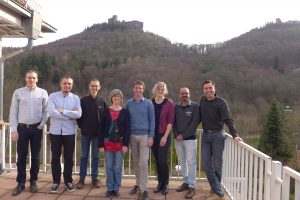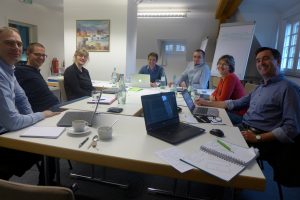In this post, Stefanie Allgeier and Carsten Brühl report about their recently organized workshop on impacts of mosquito control using Bacillus thuringiensis israelensis (Bti), which was part of our project “Establishment of a nature conservation-compatible concept for mosquito control”, funded by the German Federal Foundation for the Environment (DBU).
Bti is a biocide that is used for the control of larval mosquitoes worldwide. Although proceeding globalization and climate change mainly further its use for vector control, Bti is also largely applied in natural wetlands along streams and lakes, partially located in areas designated for nature protection in numerous countries all over Europe. Furthermore, mosquito control is often desired by the population which is why environmentally friendly strategies should be discussed.

Magnus Land, Guillaume Tetreau, Thomas Tietze, Laurence Després, Oliver Frör, Stefanie Allgeier, Chandrashekhar Patil and Carsten Brühl (from left to right) in front of the Trifels Castle in Annweiler, Germany (photo by C. Brühl)
In this context, it appeared urgent to us to bring together European scientists for the first workshop on non-target effects of Bti used for mosquito control. The meeting took place end of March at Kurhaus Annweiler, surrounded by the gorgeous nature of the Palatinate Forest. The quiet and friendly atmosphere inspired the small group of scientists from Germany, France, Sweden and Switzerland to discuss the current state of research, regulations in the EU, public perceptions and future research options. Reviewed topics included undesired direct and indirect effects on non-target organisms (midges, amphibians, birds and dragonflies), persistence and resistance of Bti and its spores, as well as socioeconomic issues.

Small group of highly motivated scientists discussing the environmental impact of mosquito control (photo by C. Brühl)
We would like to thank all participants for the fruitful discussions and exchange of knowledge and experiences. Hopefully this newly created platform of European specialists can continue to work together in the future.
